There are many faces to Karl Fraunhofer and over the course of the last few years I’ve come to know at least two few of them through the music he produces. “I have a split personality when it comes to music” he says with the white noise of the Akerselva gushing past the window of his loft studio.I consider the sound as a sample, but push past the thought to get on with the subject at hand.
I’m calling on Karl for an interview and a studio tour during a time he has assumed his Dortmund personality and find him in a creative flurry, putting the finishing touches on what will no doubt be a future Techno release. It’s an unmistakable Techno track; repetitive with just a hint industrialism as melodic instruments find a new purpose as percussive parts.
During the day he can either be found working the counter at Deluxemusic or installing some AV system in one of the many nightlife spots in Oslo. At night he might moonlight as an audio engineer, fixing and modifying synths for those close enough to ask, but on the occasion I meet him he is clearly in a more creative mood as Dortmund, with a Logic project file illuminating his face in the hue of a single ceiling light, dimmed to the horizon of a void.
Dortmund is the spasmodic Techno project Karl shares with French producer and Florian Grisard, but for this track he’s assumed the captain’s chair and his flying solo. Karl’s taking “break from the eighties stuff” after releasing Santa Cruz on the UK Sprechen label, and picking up the Dortmund project where he left off earlier this year on Thomas URV’s Ploink label.
“I haven’t really signed it”, elucidates Karl on the track he’s working on, but it “ is probably about 80% done”. Karl is very much engrossed in the track when I meet him in his studio, as he keeps turning to it, referencing it as we talk. The studio is a comfortable musician’s hovel, neatly arranged to accommodate a small arsenal of synthesisers and an impressive studio console. Everything is at arm’s length from Karl’s position, ready to be pounced on with tremendous ease, including a bottle of vodka, lying idle next to his desk.
“It’s all about the creative process” says Karl, and the impressive array of tools are just that, a set of tools to manipulate and realise his creative will. The equipment around him is enough to make any synth-obsessive salivate, but Karl defers from calling himself a collector.
“There’s a lot of people that have a museum at home and they make like pling-plong music, and they never release stuff. I could probably do that stuff too, but I like to produce and DJ and I like people to hear my music.”
There’s never “really any goal” with the music Karl produces, except perhaps “playing your track in a club and watching people have fun to it.” He feigns the thought of finding a particular context for his tracks, and enjoys hopping from the bouncing eighties House arrangements of Fraunhofer to the more brutalist Techno club tracks of Dortmund, and he does so with the ease of a musical savant. Both worlds however come together in his studio by the river and it’s here, through the machines that we attempt to form a picture of a producer and artist that’s more than just a sum of his machines.
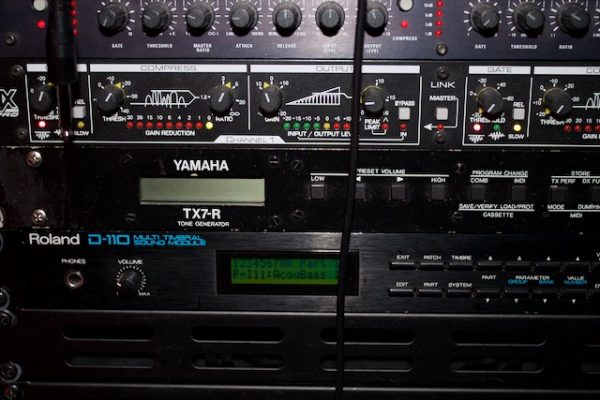 Yamaha – TX7 – “R”
Yamaha – TX7 – “R”
Let’s start with your first synth…
My first synth? It’s not actually here right now, but it’s a DX7. I have a rack version of it in the studio today, which is called the TX7-R. The TX 7 is a desktop version of the DX7 and this old Norwegian guy built it into a rack with a steel frame.
Is that where the music started for you, with the synths?
I started making music when I was 14/15. I always had a computer at home and it started with FastTracker and cuBasic. My dad is a musician so there was always some audio stuff going on, but it really started when I got my first copy of Fruity Loops, which was my introduction to synths through VSTs.
That’s also when I started listening to the bigger producers, and realised they had real synthesisers, objects you could touch and feel. The first proper synth I bought was actually a moog. I was living in Australia and my friend bought a Little Phatty and a Virus Ti and he didn’t really know how to use it, and because I already new synthesis, through the VSTs I got to borrow it. At the time it was all about Electro and that’s when the bug actually bit.
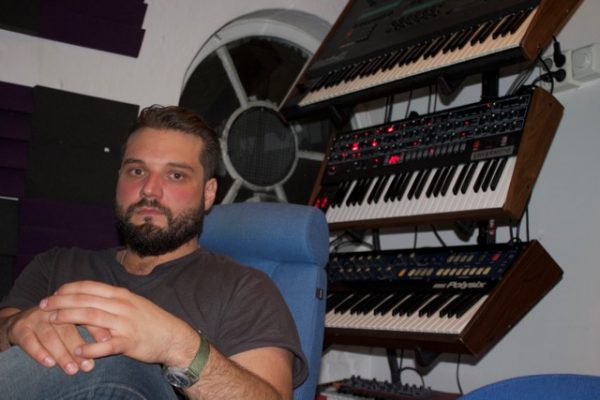 That was around 2004/5 I guess?
That was around 2004/5 I guess?
I started doing a little before then, but that was all in the box. I was enrolled in an audio course at the conservatory in Australia and it was when I started using hardware when a studio career started.
Tell me a bit more about your Dad.
He is a Jazz musician.
And his instrument of choice?
The trumpet, It’s a mono instrument as well, you know. (Laughs) I do like my mono synths… but then again I like my poly synths as well. As you know I have a split personality; Karl Fraunhofer takes care of the eighties stuff and then there’s the Dortmund Techno project, which is mono again. (Laughs) I’m not into Jazz though.
You have that musical inclination there through, when it comes to the Fraunhofer stuff. The arrangements and the composition of those tracks show a very adept musical ability.
I suppose the eighties stuff does, yes.
What was some of the first music you produced and released?
It’s really awkward, but this is before I started with synthesisers, and I was doing Hard Trance and similar shit… that was back in the day though. My first serious release came when I was 16/17 and it was released on vinyl. It’s so awkward I won’t even mention the label or the track, because that’s not me, it was my twin brother. (Laughs)
Another personality?
I did it because all my friends liked it and it was the cool thing to do at the time. I was always into House music and Techno and I was always trying to persuade them over. Ultimately, I was moving in the wrong circles before I met the guys in Australia who were really into House music, and I was like: “Finally!”
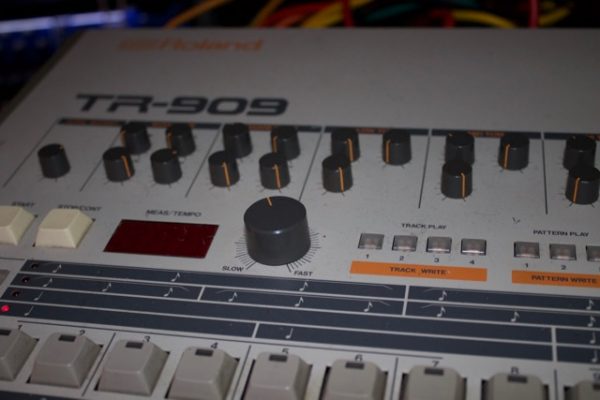 Roland TR- 909
Roland TR- 909
When you started picking up on a sound that you liked, what was the instrument that sealed the deal for you?
It was always the 909. There’s something about the hi-hats and the kick, and I can never get bored with it. You could use it in brutal Techno or in smoother House and it always sounds cool. It’s interesting, because there are these rules about it that if you do Techno you don’t engage the shuffle, but if you do House you engage the shuffle, and it gives the machine an entirely different personality.
Every 909 I’ve tried sounds different, and the one I’ve got was from DJ Geronimo, who used to be the man back in the day and the boss for EMI in Norway. And the way he tells it, is that he got it from Boy George, so there’s a bit of history to it. When I got it, it was completely ruined, it had a birds nest in it and clearly had not been loved for some time, so I had to restore it.
That’s also another part of what you do, you restore these instruments?
Yes, I’ll restore or fix things for friends. Right now, outside on my service table, I just did a Korg Mono/Poly and retrofitted a midi kit for Martin Horntveth from Jaga Jazzist. I don’t always have much time to do that type of thing, because of work and music.
Knowing the inside working of your synthesisers, must put you at an advantage when calling up sounds that you want to use.
Yes, I can kind of smell this is not the right synth, when I’m working on something. And when I don’t get the sound with analogue synths or digital synths, then goddamnit, I’ll turn to the VSTs. Sometimes you just can’t get those fat digital basses, even through a DX7 and you just have to turn to a VST.
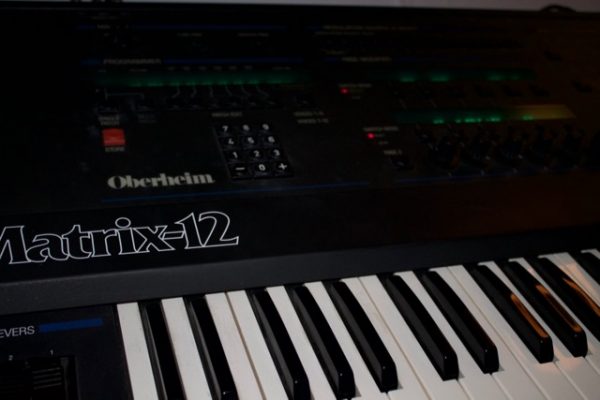 Oberheim Matrix 12
Oberheim Matrix 12
For the Fraunhofer, eighties sound, which is the synth you turn to first?
The Oberheim. It’s quite a rare synth. It came in two revisions, the American and the Japanese, and the Japanese version is very shit – it even has fans in it – but this is the American one, and fun fact; Todd Terje also has the American version. The Oberheim is actually like a hard-patched modular, with a matrix you can tap into and change.
When you go to it, is it about using it for its keyboard and arrangements, or is it a specific sound it has?
When you do the eighties stuff it’s all about a brutal chorus and this has that in spades. Other things like sweeps, it does those very well when compared to samples or VSTs, and you get a sound that almost nobody has. It’s a pretty exclusive synth.
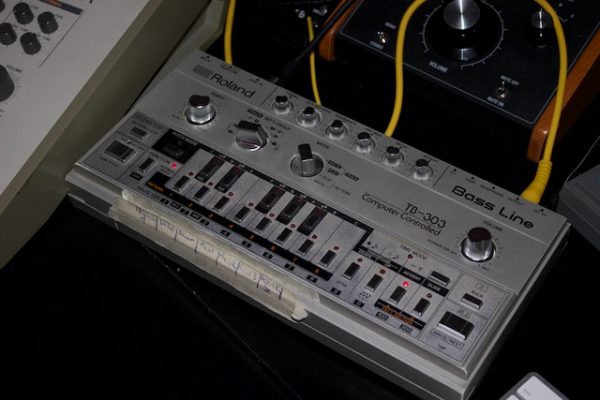 Roland TB-303
Roland TB-303
Where are you most likely to turn in here for the Dortmund project?
It depends, it can start with a bass line on the mono poly, or a sample from the 606. When you work on a Techno track, you work a lot with samples. You can record one sound or you can record a sequence, but you work with it very much on a sample -based workflow. I’m also a big fan of Acid and if I’m not feeling particularly creative, I can just switch on the 303 and it does all the work for me.
And where does Florian Grisard come into the picture, concerning Dortmund?
We used to work together a lot, but the last three years has been me solo all the way. Florian has a wife and a kid and he moved way, but I hope he comes back again. We are still talking and he often helps me out with tips or tricks, but he’s a busy guy too.
What are your thoughts on Techno in its current state, especially in Norway?
There’s a lot of cool people here that play great music, have a great selection and produce a lot of cool Techno. But there are also these guys that are basically Tech-House people, who do that Ibiza sound, and they misinterpret the genre. They call everything Techno, but it’s not really Techno. I’ve even booked to gigs as a Techno DJ where the promoter doesn’t seem to understand what Techno is.
How do you differentiate between Techno and Tech-House?
Tech-House sounds very digital. It’s also more static compared Techno. Even old Techno, which was made in a garage using shitty gear, sounds so much cooler.
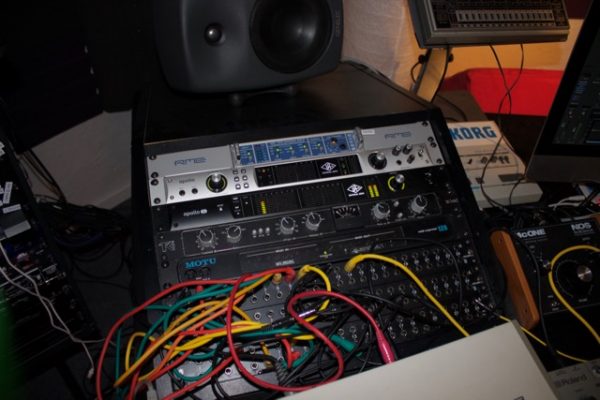 Universal Audio Apollo
Universal Audio Apollo
Much of the appeal of your sound I find is not particularly in the characteristics of the machines you use, but in the way they sound when you’re done with them in the post production process. Where do you start off with that process, and I’m particularly thinking of your last EP, Santa Cruz?
Most of those tracks start with the shittiest machine ever. I’ve got my favourite there, the TR-505. You can pick one up for $100 today, but there’s something about the hi-hat, kick and a snare on that, that just sounds so tight. I run it through the LA 610 and just compress it a bit to add some flavour to it. It just sounds right in the mix, and then I might do some post processing with EQ and layering. I’m a big fan of the universal audio soundcards with the DSP. They’ve saved me a lot of money because I’ve A-B tested them with the analogue stuff from Universal Audio and it sounds 99% the same, so yeah… go digital!
I think that conversation is pretty moot now, because the benchmark for sound is mastering, and that is all digital today.
There’s like super-high-end and then there’s digital and at the end of the day 90% of the music is going to end up in shitty Iphone earbuds anyway. My practise is to use the best of both worlds.
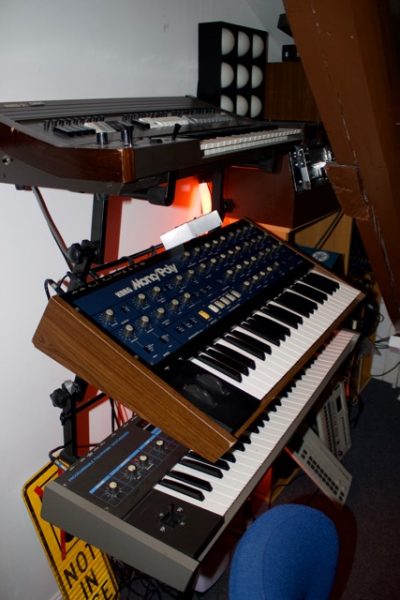 A Korg Guy
A Korg Guy
What’s the most recent addition to the studio? I notice that there’s some new looking modular bits.
That’s not actually mine. That’s Tod Louie and Solaris’. I’m really afraid of modular stuff, I’ve played on it and I love it, but I realise I’ll go broke very soon if I start delving into that world.
Yes, and it’s not the big things that add up to that much, it’s the little things, the utility objects you need that take the biggest chunk out of your wallet.
That’s why I like my Korg MS-20. It never disappoints; it’s simple raw and old school.
It’s got a very distinct sound.
Yes, the high-pass-filter defines it.
But getting back to your latest purchase?
I’ve not bought that much lately, because I’m really happy with my current setup, but I guess the last thing I got was the poly 61. I’ve had it for a year now, but I also work in an audio shop, so I get to try a lot of stuff. My next purchase is going to be an Roland/Studio Electronics SE-02.
Do you also keep your eye for new developments, it’s not just about collecting old synths?
I’m not a collector, and I sell anything I don’t use. I sold a lot of stuff in recent years. I’m a Korg guy. I love the Mono/Poly; I love the Poly 6 and the poly 61 hasn’t disappointed at all so far. I’ve also got the ∑, and that’s probably the craziest synth I’ve ever used.
I noticed that immediately when I walked in, and I’ve never seen or heard it.
It has two joysticks and it even has aftertouch, and it’s from ‘78. It’s one of the first performance synths and it has like 20 oscillators. It is the predecessor for the MS-20 and it has the MS-20 oscillator and filter in there. It looks like an organ, and even has a place to rest your sheet music. It’s got CV / gate, but what’s really cool is that it has a ring modulator for all the oscillators. You can do a lot of quirky stuff with it, and it’s probably one of the most underrated synths, because when you try out, it can be a little boring, but when you play around with it a little more it opens up a whole new world.
It sounds like it might be gracing some future projects. But as far as the Fraunhofer/Dortmund projects go, how do you see them evolving in the future?
There’s a lot of stuff going on. Two years ago I signed with Ploink, and I’m still working with Thomas (URV). I hope to release a bit more on there and take it to other labels too. I did a release on Spectrowave in France; I tend to do a lot through the French scene.
Is that Florian’s influence?
Yes. We also did some stuff through Sony in Italy, but I think it’s cooler to do the local underground stuff at the moment. Maybe the big ones will pick me up later… I don’t know, we’ll see. I don’t have any plans set in stone, I like making music and we’ll just see what happens with the rest.
Great, I’ll let you get back to that then… making music.

